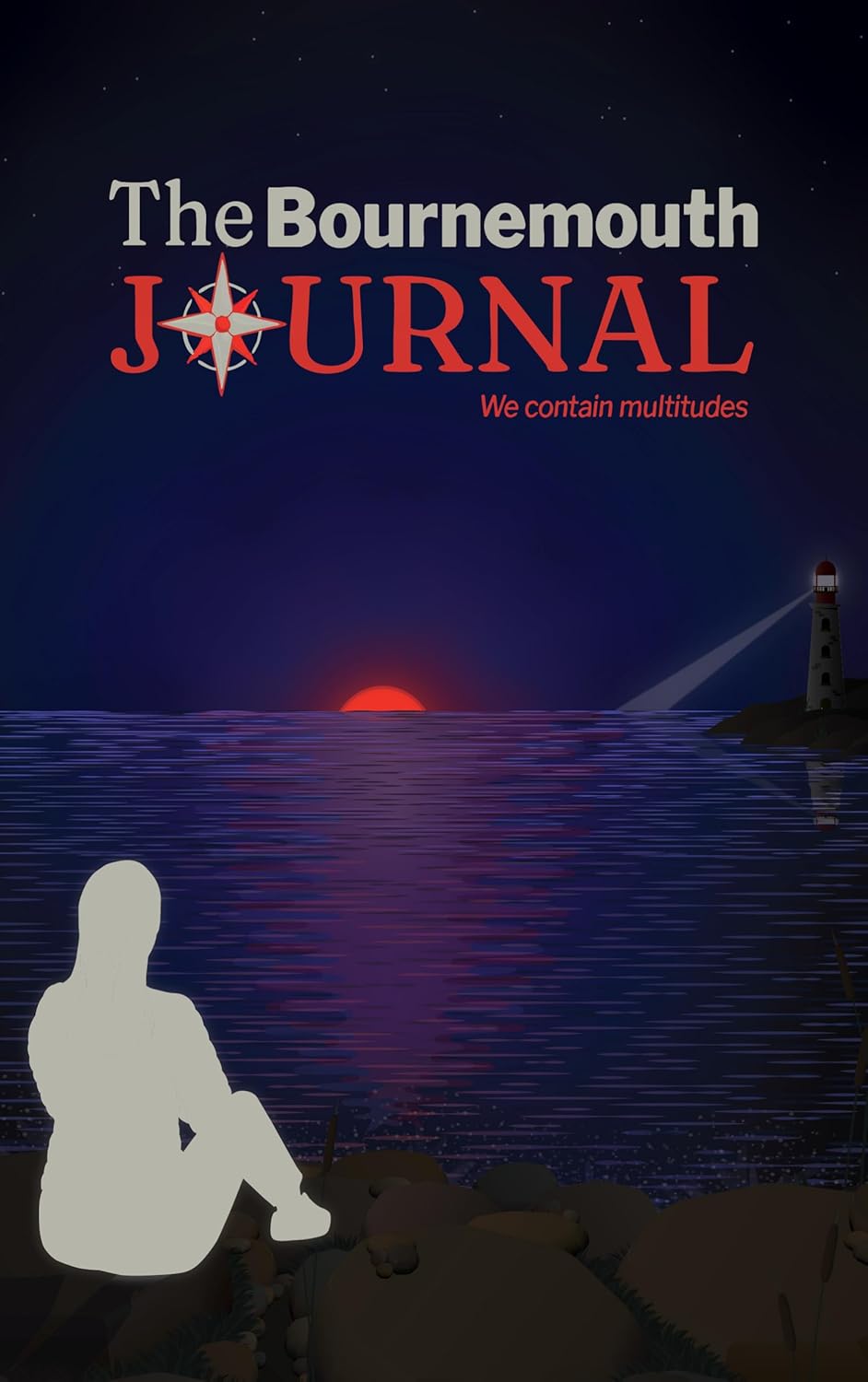
From the 1st of October 2025, issue 2 of The Bournemouth Journal is available in print-on-demand at Amazon.
Poetry Example:
Flood
Suzanna Fitzpatrick
The sheep wake you. Keening,
not bleating, the noise mammals make
when they sense death. Goosebumps
try to rouse your non-existent pelt
as you grope for the clock. Two a.m.
There’s a gale blowing: rain
slaps shuddering windows
over another sound. The sea,
closer. Realisation douses sleep
and you jump out of bed into water
that’s knee-deep. The sea-wall’s breached.
Wake your family, wade out
into the shrieking void, starless
save for the neighbours’ torches
strobing in panic. Evacuate –
but nowhere’s higher than the tide
on this peninsula; the wall
has always kept things dry.
Someone brings a boat
and you go after the flock, hoping
to find them in the dark. Only one.
You grab her sodden fleece, heave
her kicking fear onboard. She’s calling
for her lambs, but they don’t answer.
Shivering, you gather in the barn
waiting for light’s unkindness
to show you fields grey as the sky,
wrecked homes, drowned sheep.
Short Story Example:
The Maid
Ian Gouge
She liked to set herself apart. Not physically – or, at least, not especially so. Yes, she’d with draw from the body of the group sometimes and sit on her own in a corner or leave what ever building she happened to be in and go outside ‘to walk’ she said, or ‘to think’. Given our general circumstances and the comfort to be had in not being alone, such action was idiosyncratic – though less so when you considered some of her other attributes. In addi tion to being slightly aloof, she couldn’t help but exude a certain superiority; people looked up to her. It was as if she were party to a secret being kept from the rest of us.
Should the opportunity arise, she also had no problem demonstrating just how physically strong she was. Usually, this prowess manifested itself in small things – like twisting tight lids off jars – but she could chop wood, dig ditches, and haul stone with the best of the men. And her movements were executed with such undeniable ease that you felt there was always more to come, that she hadn’t yet explored the full extent of her powers. Because that’s what some people thought she had – at least, in comparison to the rest of us: a ragbag assortment of the average, each attempting to navigate our way through life with the minimum of effort and the minimum of ambition. Some had none at all.
Although she never spoke of any driving force, you couldn’t help but think she was harbouring something, dark or otherwise. More than once I had the sense of a hidden pact, even if I could have no comprehension as to who – or what – her pact might be with. The simplest and most logical explanation was that, if such a thing existed, it was a contract with herself which drove her on: an intensely personal competition or compulsion or challenge. Or her internal engine combusting constantly, even when she was sitting alone in the corner of a room or out walking in the fields.
One or two had tried to get close to her (though not me, you understand). She seemed to tolerate their advances for a little while before putting her suitors in their place. It left me in mind of puppies retreating with their tails between their legs. Ask them what happened after such an encounter – Axel or Simon, for example – and they would decline to answer, even under the influence of copious quantities of alcohol. Push too hard and they would start to defend her vehemently. It was as if they had seen something remarkable or had been privy to a sliver of her secret and had sworn to keep it on pain of death. Even early on, a few of us thought she had the capacity for dealing in death too.
Not that you would make such an assumption at first glance. She was, after all, relatively petite. From what I’ve already said, you could be forgiven for imagining some great hulking brute of a woman; but she was not like that. Far from it. Yet she did nothing to promote her femininity – which I’m sure she could easily have done. She had long and lustrous hair which she wore loose (against both practicality and the prevailing fashion), and although she liked to wear trousers and crude tunics or jumpers most of the time, on rare occasions communal celebrations usually – she might be seen in long dresses which seemed to float around her, almost as if they were afraid to touch her body. In those moments – hair loose, her clothes almost diaphanous – some of the men would glance at each other, and though nothing would be said, you knew they were all thinking the same thing, wondering… Well, you know… Perhaps that’s what drew Axel and Simon in, that wondering.
Times had been hard, of course. Isolated as we were, in the absence of any reliable news, rumour held the upper hand. Now and then, travellers would pass through our small town and, seeing us starved of recent knowledge about the outside world, they would regale us with stories of what they had heard or witnessed firsthand. A few of these, revelling in short-lived attention, took the opportunity to embellish, even fabricate. The challenge for us became to sift the truth from the lies, the wheat from the chaff. On such occasions – these strangers finding themselves at the centre of a small cluster of avid listeners – she would hold herself apart, on the periphery of things, and when the strangers were gone, one of us would usually ask her what she had made of their tales. ‘Mainly confection,’ she would say, or ‘little more than fabrication’. She never gave them much credence. She asked why we should trust what they said. It was as if she knew the truth of the matter.
No-one was surprised when war eventually came, when we first heard the guns from the other side of the valley. Though we had been certain the conflict would engulf us one day (all the while praying for the opposite), we still managed to run around panicking for a while, forgetting what we had been told about arming ourselves, manning the defences, the processes to be followed. Everyone except her. As the first shells began to fall nearby, we found she was already prepared: her hair tied back, her clothes sturdy and functional, a weapon strapped to each hip. As if she had known. Like lost sheep, many of us had gathered about her.
‘Well then,’ she said, unable to keep pity from her gaze, ‘you know what you must do.’
And on one level we did. The easy things. Going to the armoury to sign-out a rifle; finding our assigned slot on the city walls; establishing the most effective prone position from which to look out across the fields whilst sheltering behind inadequate masonry. Yet, although we kept watch, we could see nothing: no movement in the woods beyond the river, no sign of vehicles on the road. From somewhere beyond the trees, we saw the occasional flash of heavy artillery – a sighting immediately followed by the tell-tale whistling of shells, an explosion outside the walls. The ground shook with increasing violence as the enemy gunners found their range. Soon, they would start hitting our defences, each of us hoping not to be the first to die.
In a lull between salvos, her voice suddenly echoed from beneath us. ‘I’m going after the guns. I need five men.’
It was the kind of moment when you hoped you were invisible, when you lay even closer to the stone. I dared not look, knowing that if she caught my eye, I would be lost, unable to deny her.
After a few moments, the gates opened, and she walked out with five in her wake. The
rest of us were happy to look up at that point, wanting to see who was going with her, grateful it wasn’t us. Axel was one of the five, perhaps still hoping to win her favour.
With the next report, the next shell, the little group broke into a run and headed for the bridge over the river. A few seconds later, the wood had absorbed them. Those of us left on the wall glanced at each other, unsure what to say, perhaps unable to speak altogether. We looked back to the trees, to the space that had swallowed them. We waited: for the next shell, for the six of them to reappear.
Less than ten minutes later came the sound of small-arms fire, and then a huge explosion. This new sound was accompanied by a plume of smoke rising from the trees – and then nothing. The silence was eerie, unexpected, menacing.
It was broken by someone to my left shouting ‘The woods!’, at which point we saw four men emerge from the trees and head for the bridge. They were carrying a fifth person. It was only when they were within a few yards of the gate that we recognised their burden. And that the missing person was Axel. Instinctively, most of us left our stations on the wall to go down and discover what had happened.
Once they were in the compound and the gates had been closed, the bearers laid her body on the ground. The silence was profound, filled with its own kind of language. Then
one of the men said, ‘She and Axel managed to blow up the guns with grenades, but they shot her in the firefight that followed. Him too. We thought we might be able to save her, but she died in the woods.’
I wondered how Axel had fought and whether she would have been impressed. And then – probably like every man there – I suddenly realised how, up until that point, she had been quietly holding us together, and that we had no idea how to go on without her.
Then there came a shout from up on the walls, and we knew we were lost.
